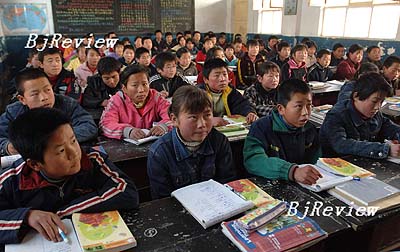|

Inner Gap Matters Too
The income gap between different industries in China is widening rapidly, as a result of the sharp income growth in monopoly industries and the slow growth happening in other industries. However, another factor that is enlarging the inter-industry gap is always missed, that is, the income disparity within the industry.
Actually, the disclosed overly high incomes in monopoly industries are just an "average" figure: A high-level management position offers an annual pay of a million yuan or more, a middle-level position offers half of that while common employees only earn thousands or even less.
It must be admitted that when adjusting the salary increase scheme, business executives will make it more beneficial to themselves-the small fraction of managerial personnel may make their salaries grow by several times higher than that of ordinary workers.
Undoubtedly, if the salary gap within certain industries can be kept at a rational level, the average salary in these industries will drop too, which will help to narrow the gap between different industries. At present, it seems that to narrow this gap is an inevitable way to control the quickly widening income gap.
Dazhong Daily
Honor or Shame
According to the newly issued rankings of top 100 Chinese public companies, the Industrial and Commercial Bank of China (ICBC) overtook China Petroleum and Chemical Corp. as China's richest company, immediately followed by the Bank of China (BOC).
It's nothing wrong for lenders to make money, but the four state-owned commercial banks, including ICBC and BOC, are not supposed to focus on profit only.
However, to maximize the profit margin, these banks have, in recent years, repeatedly launched new pay services, most of which are targeted on middle- and low-income earners. To some extent, it is the extra charges that push them to the top of the wealth list.
Generally speaking, in an environment of full competition extra charges will be restricted by the market. This is something that safeguards customers' interests. For a state-owned commercial bank that has become a laureate on the wealth list, the customers' interests must have been impaired more or less.
State-owned commercial banks are free to make money, but at the same time they should never forget their important role in macroeconomic regulation, in offering good services to their customers and a series of social responsibilities. Apart from making profit, they have so many other things to do.
Workers' Daily
To Make the Process Transparent
The National Development and Reform Commission, China's top price regulator, recently indicated that in 2008, urban citizens would have to pay more for water use.
Faced with a severe water shortage, water saving is inevitable. However, this cannot be used as the excuse for increasing the water price. For example, if the production costs of water companies are rising because of inefficient operation or due to the extremely high pay the employees of these companies receive, then it's unacceptable for users to pay the bill.
Besides, as water resources become more and more precious, the water price covers not only operational costs but also resource consent charges. These two parts must be separated.
Since water is a public product, the water supply sector can't be chasing exorbitant profits. Therefore, the resource consent charges included in the water price should not belong to water suppliers, but should be used for water resource conservation. Otherwise, the move to raise the water price is actually missing the target and it is just helping the suppliers to benefit more from the scarce resource. To win the understanding and support from the public, water suppliers must make these processes clear to the public.
Beijing Youth Daily
Crowded Classrooms
It's reported that in Chengguan Junior Middle School in Gucheng County, north China's Shanxi Province, in a classroom of 60 square meters sit more than 100 students. In this school, the smallest class has 70 students while the largest has 125. In accordance with regulations issued by the Ministry of Education, a standard 54-square-meter classroom can at most accommodate 45 students.
In order to make classrooms less crowded, the local government has made great investments to expand the school size. However, these measures still can't rectify the situation. Despite the growth in their number, classrooms are becoming increasingly crowded.
To some extent this situation should be blamed on the limited funding for education, but the key is the inequality of funding on education. Local governments all tend to invest in key teaching institutions, like Chengguan School. As a result, while these schools become increasingly large and luxurious, schools in rural areas are left far behind. An extreme example is that in some areas, the total assets of a rural school are less than that of a classroom in some key schools.
In this situation, parents all want to send their children to key schools, making classrooms in these schools more and more crowded and schools with poor facilities sometimes even can't recruit enough students.
To simply expand the size of key schools can never solve the problem fundamentally, but something must be done to balance the investment in key schools and non-key schools.
Workers' Daily | 